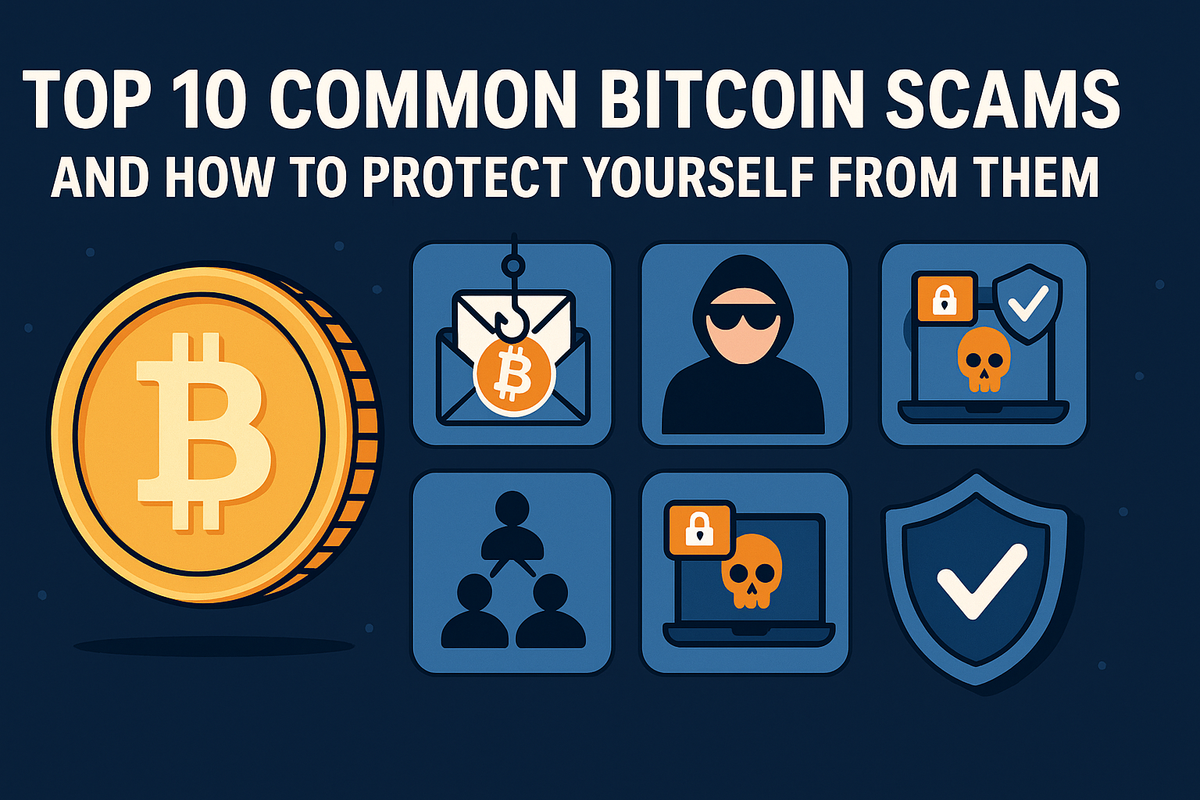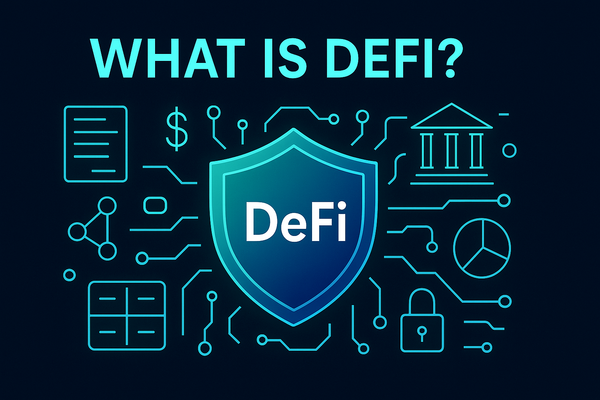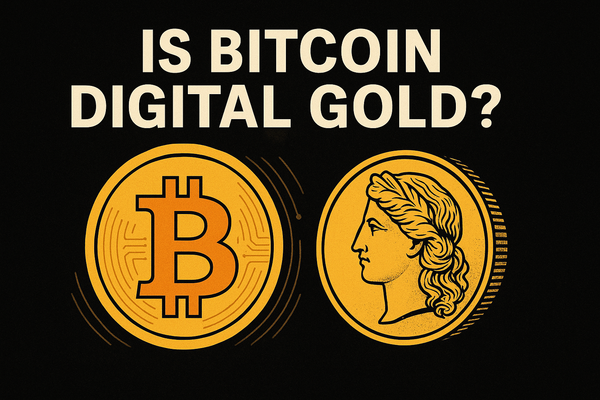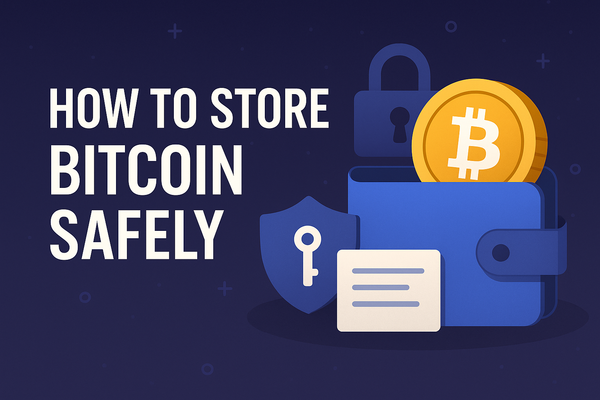Top 10 Common Bitcoin Scams and How to Protect Yourself from Them
Discover the top 10 most common Bitcoin scams and effective ways to protect your assets. This comprehensive guide provides practical tips to keep your Bitcoin secure.

In the rapidly evolving world of cryptocurrency, Bitcoin continues to be the most popular and widely adopted digital asset. However, as its popularity grows, so does the number of scammers looking to exploit unsuspecting users. Bitcoin scams are a major threat, with fraudsters using increasingly sophisticated methods to steal funds or personal information.
In this article, we’ll dive into the top 10 common Bitcoin scams that users should be aware of. From phishing emails and fake giveaways to more complex Ponzi schemes and rug pulls, Bitcoin scams can take many forms. The key to protecting yourself from these malicious actors lies in understanding how these scams work and learning how to recognize their warning signs before it’s too late.
With the proper knowledge and precautions, you can safely navigate the Bitcoin ecosystem and keep your assets secure. Let’s take a closer look at the most common scams you need to watch out for and the best practices to safeguard your Bitcoin holdings.
What Are Bitcoin Scams?
Bitcoin scams are fraudulent schemes designed to deceive individuals into either sending their Bitcoin to criminals or revealing sensitive information that can lead to theft. These scams exploit the pseudonymous nature of Bitcoin transactions, making it difficult to trace the criminals once they have access to a victim's funds.
In many cases, scammers use tactics such as phishing, impersonation, or fake investment opportunities to trick people. With the rise of cryptocurrencies like Bitcoin, malicious actors have found new ways to exploit the lack of regulation and the general inexperience of many users.
What makes Bitcoin scams particularly dangerous is the irreversibility of Bitcoin transactions. Unlike traditional bank transfers, once Bitcoin is sent, it cannot be retrieved, and once private information is compromised, it’s often too late to take corrective action. As Bitcoin continues to grow in value and popularity, so too does the need for caution. Understanding the various types of scams is the first step in protecting yourself and your digital assets from being stolen.
Top 10 Common Bitcoin Scams
In this section, we will explore the top 10 most common Bitcoin scams and explain how they work, including real-world examples and tips on how to avoid falling victim to them. Understanding these scams is crucial to protecting your Bitcoin and your personal information.
1. Phishing Scams
Phishing is one of the most common types of scams in the cryptocurrency space. It involves fraudsters impersonating legitimate businesses or websites to steal your personal details or Bitcoin wallet information. These scams typically come in the form of fake emails, websites, or pop-up messages designed to appear like they’re from trusted sources.
- Real-World Example: A fake email posing as a popular cryptocurrency exchange may prompt users to log in via a link that redirects them to a malicious site designed to steal their login credentials.
- Protection Tips: Always double-check URLs before clicking links, especially those in unsolicited emails. Enable two-factor authentication (2FA) on your accounts to add an extra layer of security.
2. Impersonation Scams (Fake Giveaways)
Impersonation scams often involve scammers pretending to be influential figures in the crypto world, such as famous personalities or the creators of Bitcoin. They offer “free giveaways” in exchange for a small payment or deposit. These scams exploit the victim's desire for free tokens or promises of large returns.
- Real-World Example: A scammer impersonates Elon Musk on Twitter, claiming he’s giving away Bitcoin to celebrate a milestone. Victims are asked to send a small amount of Bitcoin as a "deposit" to receive a larger sum back.
- Protection Tips: Always be skeptical of “too good to be true” offers. Never send Bitcoin or any cryptocurrency to someone promising to send you more in return.
3. Rug Pulls
A rug pull occurs when developers launch a cryptocurrency or token and, after attracting investors, suddenly withdraw all of their funds, disappearing with the money. This typically happens in decentralized finance (DeFi) projects or new token offerings.
- Real-World Example: A new DeFi project promises huge returns on Bitcoin investment but after users buy into the token, the creators suddenly withdraw all liquidity, leaving investors with worthless tokens.
- Protection Tips: Research new projects thoroughly. Look for well-established teams and verify smart contracts before investing. Avoid investing in projects that offer unrealistic returns.
4. Pig Butchering Scams
Pig butchering scams are elaborate schemes where scammers build a relationship with their victims over time, often pretending to be romantic interests or business partners. After gaining their victim’s trust, the scammer convinces them to make a substantial investment in a fake Bitcoin scheme.
- Real-World Example: A scammer befriends a victim on social media, builds an online relationship, and then persuades them to invest in a fake cryptocurrency exchange.
- Protection Tips: Be wary of unsolicited contact from people promising to help you invest in Bitcoin. Never send money to someone you haven’t met in person, especially if they are pressuring you to act quickly.
5. Fake Wallets and Apps
Scammers create fake wallets or applications designed to steal your private keys or Bitcoin directly from your device. These fake apps can be found on unofficial app stores or as malicious downloads from suspicious websites.
- Real-World Example: A scam app designed to look like a legitimate Bitcoin wallet requests your private keys, giving the scammer full control over your funds.
- Protection Tips: Only download wallets and apps from trusted sources like the official app store or developer website. Always double-check the app’s reviews and ratings before installing it.
6. Ponzi Schemes
Ponzi schemes promise high returns on Bitcoin investments but rely on incoming funds from new investors to pay returns to earlier investors. These scams eventually collapse when new investments slow down and the scammers disappear with the remaining funds.
- Real-World Example: A Bitcoin investment platform promises daily returns of 5% and encourages users to recruit others. Eventually, the platform shuts down, and the scammer vanishes with the funds.
- Protection Tips: Be wary of any investment promising consistent, high returns without clear, legitimate business operations. Always verify the claims and seek independent reviews.
7. Investment Scams (Fake ICOs)
Fraudsters often launch fake initial coin offerings (ICOs), promising early access to a new, revolutionary cryptocurrency. Once investors send their Bitcoin, the scammers disappear, and the coin or token is never launched.
- Real-World Example: A project promises a new Bitcoin-like cryptocurrency and asks for Bitcoin in exchange for early tokens. After reaching their target amount, the project creators vanish.
- Protection Tips: Research ICOs thoroughly before investing. Only participate in ICOs with a well-documented history, clear whitepapers, and reputable backers.
8. Romance Scams
Romance scammers prey on individuals looking for companionship. They build emotional connections with their victims and then create a fabricated emergency to ask for Bitcoin or other cryptocurrencies to "help" them out of a situation.
- Real-World Example: A scammer establishes a romantic relationship through a dating app and eventually convinces the victim to send Bitcoin to help with a supposed health emergency.
- Protection Tips: Be cautious if someone you’ve met online asks for Bitcoin or other forms of payment, especially if you've never met in person. Always be skeptical of individuals who create urgent emotional appeals.
9. Blackmail Scams
Blackmail scams occur when scammers threaten to expose personal information or intimate photos unless the victim pays them in Bitcoin. These scams typically rely on fear and intimidation to extort money from victims.
- Real-World Example: A scammer sends an email claiming to have compromising photos of the victim and demands Bitcoin to keep the information private.
- Protection Tips: Ignore any blackmail attempts and report them to local authorities. Do not send Bitcoin or other payments under threat.
10. Malware and Ransomware
Malware and ransomware attacks are designed to infect a victim's computer or device. The attacker may steal private keys or demand a Bitcoin ransom in exchange for restoring access to encrypted files.
- Real-World Example: A user unknowingly downloads a malicious file that encrypts their computer's data, and the attacker demands a Bitcoin payment to decrypt the files.
- Protection Tips: Install antivirus software, avoid downloading files from unknown sources, and back up important data regularly.
How to Protect Yourself from Bitcoin Scams
Protecting yourself from Bitcoin scams requires vigilance, awareness, and the right tools. Below are some key strategies to safeguard your digital assets and personal information:
1. Use Reputable Exchanges and Wallets
Always use well-known and trusted platforms for buying, selling, and storing Bitcoin. Stick to popular exchanges with a strong security track record, such as Coinbase, Binance, or Kraken. For storing your Bitcoin, use hardware wallets like Ledger or Trezor, which store your private keys offline, making them less vulnerable to hacking.
2. Enable Two-Factor Authentication (2FA)
Activate 2FA on all your accounts, including exchanges and wallets. This adds an extra layer of security by requiring a second form of verification (like a code from your mobile device) in addition to your password.
3. Be Cautious with Emails and Links
Always double-check URLs before clicking any links, especially those in unsolicited emails or messages. Scammers often use phishing tactics to direct you to fake websites designed to steal your credentials. If in doubt, manually type the website address into your browser rather than clicking on a link.
4. Avoid Unsolicited Investment Offers
Never trust unsolicited investment offers or claims of guaranteed returns. If someone approaches you with an offer that sounds too good to be true, it probably is. Be especially wary of high-pressure sales tactics.
5. Research New Projects Thoroughly
Before investing in a new cryptocurrency or project, always research it extensively. Look for credible reviews, check the project’s whitepaper, and investigate the team behind the project. If the project promises unreasonably high returns or lacks transparency, consider it a red flag.
6. Keep Your Private Keys Secure
Your private keys are the most critical piece of information when it comes to securing your Bitcoin. Never share them with anyone, and avoid storing them online or in places that could be easily accessed by others. Keep backup copies in secure offline locations.
7. Stay Updated on Scams
Scammers are always developing new tactics, so staying informed about the latest Bitcoin scams is crucial. Follow reputable cryptocurrency news sources and stay up to date on new threats and protection techniques.
What to Do If You Fall Victim to a Bitcoin Scam
Even with the best precautions, there is always a risk of falling victim to a Bitcoin scam. If you find yourself in this unfortunate situation, it’s important to act quickly to minimize the damage and potentially recover your funds.
1. Report the Scam Immediately
- Contact Authorities: Report the scam to your local law enforcement, as well as to cryptocurrency-specific authorities like the Federal Trade Commission (FTC) or Internet Crime Complaint Center (IC3). In some cases, law enforcement may be able to track the scammer’s activities.
- Notify the Exchange: If you sent Bitcoin through an exchange, immediately contact the exchange’s customer support team. Some exchanges may be able to freeze transactions or help trace the funds.
2. Contact Your Wallet Provider
If the scam involved a wallet (especially an online or mobile wallet), reach out to the wallet provider's support team. Although Bitcoin transactions are irreversible, they may have fraud protection measures in place for other types of theft or fraudulent activity.
3. Monitor Your Accounts and Devices
- Check for Unauthorized Access: Keep an eye on your exchange and wallet accounts for any unauthorized activity. If your wallet keys or private information were compromised, consider transferring any remaining funds to a new wallet.
- Scan for Malware: If you suspect your device was infected with malware or ransomware, run a full scan with trusted antivirus software and remove any suspicious programs.
4. Warn Others
If you were scammed, it’s important to alert others in the cryptocurrency community. Share your experience on social media or online forums to help prevent others from falling victim to the same scam.
By taking these steps, you can mitigate the damage and help prevent further losses, while also contributing to the broader effort to combat cryptocurrency fraud.
Conclusion
Bitcoin scams are a significant risk for anyone involved in the cryptocurrency space, but with the right knowledge and precautions, you can protect yourself and your assets. By staying vigilant, using trusted platforms, and following the protective strategies outlined in this article, you can reduce the likelihood of falling victim to fraudulent schemes.
It’s essential to recognize the signs of common Bitcoin scams and to take immediate action if you suspect any fraudulent activity. Always be skeptical of offers that seem too good to be true, and remember that in the crypto world, security is a personal responsibility. With the right tools and awareness, you can confidently navigate the world of Bitcoin without falling prey to scams.
Stay informed, stay cautious, and keep your Bitcoin secure!
Top 10 Common Bitcoin Scams and How to Protect Yourself FAQ
A Bitcoin scam is a fraudulent scheme designed to steal Bitcoin or personal information from users. These scams can come in many forms, such as phishing attacks, fake investments, or impersonation scams.
To avoid Bitcoin scams, use reputable exchanges, enable two-factor authentication, be cautious of unsolicited offers, and always verify the legitimacy of investment opportunities.
If you fall victim to a Bitcoin scam, report it to relevant authorities, contact your wallet or exchange provider, and monitor your accounts for any suspicious activity.
Bitcoin scams can be tricky to spot, especially since scammers often mimic legitimate platforms. However, red flags include unrealistic returns, unsolicited requests for Bitcoin, and unfamiliar websites or apps.
Yes, Bitcoin scams can be reported to local law enforcement, the FTC, or the Internet Crime Complaint Center (IC3). Reporting helps authorities track down scammers and protect others.





